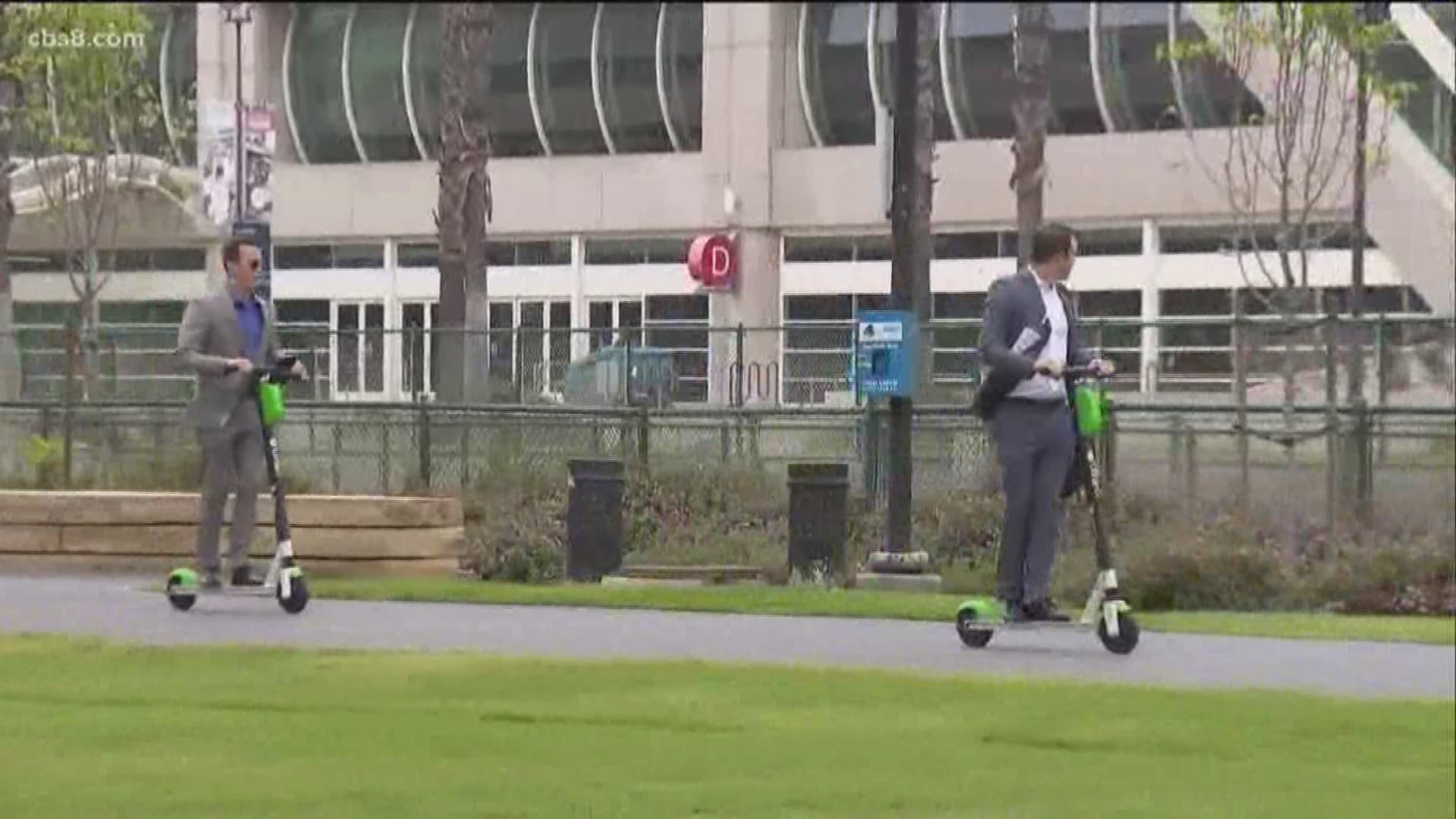SAN DIEGO — New regulations for the dockless mobility industry are in effect Monday requiring companies to obtain permits and comply with rules aimed at improving public safety, such as limiting speeds in certain public spaces and staging the devices in designated corrals.
The new rules won unanimous support from the City Council in April. They focus on six key areas – speed limits, staging and parking, rider education, data sharing, fees, and indemnification and liability insurance – intended to make the industry safer and accountable while better integrating the devices into San Diego’s transportation landscape.
Operators are required to use geofencing technology to address improper usage, parking and speeding in high-traffic areas. The technology will keep speeds between 3 and 8 miles per hour in designated areas and below 15 miles per hour in all other areas. Operators will have three hours to respond to reports of illegally parked or abandoned devices, or the devices could be impounded.
“We will begin accepting applications today from qualified shared mobility device operators,” said Department Services Department Director Elyse Lowe. “The City looks forward to ongoing engagement from the operators to discuss and evaluate their efforts to ensure safe sidewalk conditions for pedestrians, and compliance with the City's requirements.”
Mobility device operators will also be required to place easily distinguishable labels on each device to inform users of age requirements for using the device that it is illegal to ride on sidewalks.
The program also calls for a six-month permit that allows City leaders to hold companies accountable by declining to renew permits for operators that fail to follow the new rules.To receive a permit, companies will pay a $5,141 fee and must declare how many scooters and e-bikes they will have in the market for that time period, preventing rapid fluctuations in fleet size throughout the year.
Below is a complete list of all the new rules:
Speed Limits: In specific geofenced areas, operators will slow scooters to 8 mph. Three of the geofenced areas are pedestrian-only and operators will slow scooters to 3 mph with a push message notifying riders to leave that area.
- Geofencing will be in effect for beach-area boardwalks, Balboa Park, NTC Park, Mission Bay Park, Petco Park and the pedestrian-only locations, including North/South Embarcadero, Martin Luther King Jr. Promenade and La Piazza della Famiglia.
Staging: Operators will no longer be able to stage scooters and e-bikes on sidewalks in Downtown.
- The City has identified – and is currently installing – 330 on-street dockless parking corrals throughout Downtown where staging is allowed.
- In the beach areas, operators are only permitted to stage in groups of up to four, with 40 feet in between each group. The City will identify corral locations in the beach areas and, once installed, will require their use.
- The City also will conduct an evaluation of locations throughout San Diego where designated parking corrals would be beneficial and, working with the City Council and communities, install more.
Rider parking: Operators will prohibit riders from ending a ride in specific geofenced areas, including beach area boardwalks.
Education: Consistent messages about local and state laws in smartphone applications will be required, as will on-device labeling about age requirements and how riding on the sidewalk is illegal.
Per Device Fee: A per device fee of $150 annually will be assessed. A reduction of $15 per device will be offered for operators offering a qualified equity program.
- Equity programs may include discounts, equitable distribution, credit-card free unlock or mobile-device free unlock.
Data Sharing: A variety of data will be shared about ridership, parking, paths of travel and more to assist the City in transportation planning, Climate Action Plan reporting and enforcement.
Indemnification/Insurance: Operators will be required to indemnify the City from liability and to hold a $2 million per occurrence, $4 million aggregate and $4 million umbrella insurance policy.
Performance Bond: Each operator will be required to pay a safety deposit – $65 for each device in fleet – to be held in the event the company leaves the market without its devices.

